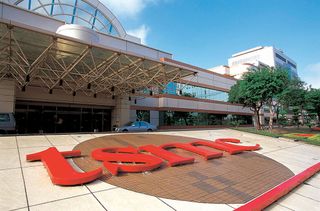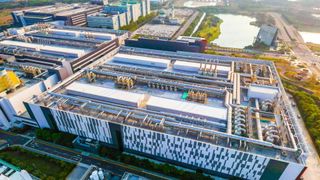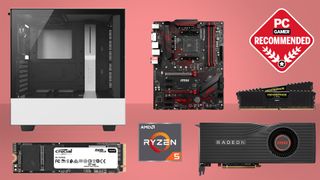An invasion of Taiwan would shut down global chip production as 'nobody can control TSMC by force.'
A war would render TSMC 'not operable'.

This week saw US House Speaker Nancy Pelosi visit Taiwan. She is the highest level US government official to visit Taiwan in 25 years. The subsequent reaction by China, including ongoing island encircling live fire military exercises, threatens an already precarious geopolitical situation.
Taiwan-based Taiwan Semiconductor Manufacturing Company (TSMC) is Asia's most valuable company. It makes many of the chips we talk about at PC Gamer, including the CPUs and GPUs in our PCs, and the chips in our phones. Given the importance of TSMC, not just to the global technology industry but to the global economy itself, these latest tensions threaten nothing less than disaster. And that's all before considering the humanitarian, political, and military consequences of a Chinese invasion.
TSMC chairman Mark Liu was interviewed by CNN’s Fareed Zakaria. When asked if TSMC was a deterrent or a catalyst to a possible war, Lui said: "Nobody can control TSMC by force. If you take a military force or invasion, you will render TSMC factory not operable. Because this is such a sophisticated manufacturing facility, it depends on real-time connection with the outside world, with Europe, with Japan, with US, from materials to chemicals to spare parts to engineering software and diagnosis."
Major companies like Apple, AMD, Nvidia, Qualcomm, and even Intel rely on TSMC for chip production. If production were to cease, the supply of many of these products would dramatically shrink. That alone wouldn't be catastrophic, but the effect on the stocks of big blue-chip companies would take a beating and it would all snowball from there. We'd get a stock market crash, financial system stress, a global recession, unemployment and so on and so on. And what if the US steps in to defend Taiwan? I don’t even want to go there.
TSMC supplies a large volume of chips to Chinese companies, too. Which means it would also suffer economically from the collapse of manufacturing within its foundry business.
The current tensions shine a spotlight on the global reliance on TSMC. Just last week the US Congress passed the Chips and Science act, which in part allocates billions of dollars in subsidies to entice chip makers to build facilities in the US. A part of the reason for this bill was to diversify chip manufacturing and give it a buffer against a possible Chinese invasion. National security and all that.
President Biden is expected to sign the Chips and Science act into law on August 9. It was delayed after he suffered a Covid relapse.
The biggest gaming news, reviews and hardware deals
Keep up to date with the most important stories and the best deals, as picked by the PC Gamer team.

In one of possibly many deals to come, MediaTek, the world's largest smartphone chipset vendor, signed a deal with Intel to manufacture certain products outside of Asia. MediaTek is a Taiwanese company and is a major TSMC customer. A big customer like this backs Intel's decision to heavily invest in US and European chip manufacturing, including its $20 billion investment in two facilities near Columbus, Ohio.

Best CPU for gaming: The top chips from Intel and AMD
Best gaming motherboard: The right boards
Best graphics card: Your perfect pixel-pusher awaits
Best SSD for gaming: Get into the game ahead of the rest
If China and Taiwan tensions don't ease off, it's only a matter of time before other companies take steps to reduce their reliance on TSMC, if they aren't already. Many companies are still suffering from supply chain woes induced by the pandemic, while others are affected by the war in Ukraine. The disrupted supply of neon gas is just one example of the effects of that war.
All we can do is hope that calm heads prevail. I'm only talking about the tech side here, but wars cause so much more damage than that. Paying more for a chip is one thing, but actual conflict is something entirely different.
TSMC Chairman Liu summed it up succinctly. "A war brings no winners, everybody's losers."

Chris' gaming experiences go back to the mid-nineties when he conned his parents into buying an 'educational PC' that was conveniently overpowered to play Doom and Tie Fighter. He developed a love of extreme overclocking that destroyed his savings despite the cheaper hardware on offer via his job at a PC store. To afford more LN2 he began moonlighting as a reviewer for VR-Zone before jumping the fence to work for MSI Australia. Since then, he's gone back to journalism, enthusiastically reviewing the latest and greatest components for PC & Tech Authority, PC Powerplay and currently Australian Personal Computer magazine and PC Gamer. Chris still puts far too many hours into Borderlands 3, always striving to become a more efficient killer.
Most Popular






